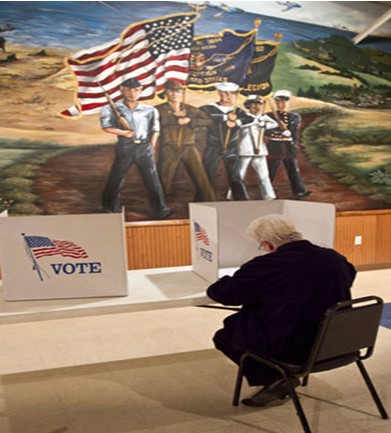发布时间: 2016年10月26日

『星条旗可能改变竞选结果。一项研究表明,当让选民在选举时看到星条旗,他们会更倾向于共和党。』
The psychology of voting: Flagging up bias
竞选心理:星条旗可能引起偏见
Aug 6th 2011 | from The Economist

FLAGS are powerful symbols. They appear on ships, parliaments, schools, lapels and even—sometimes—underwear. Exactly what effect they have on people’s behaviour, though, is seldom a topic of scientific inquiry.
Melissa Ferguson of Cornell University is trying to change that. Her experiment began during the run-up to the presidential election of 2008. She recruited a pool of 396 participants via an online advertisement. Between September 19th and October 10th these volunteers were asked to fill in an online questionnaire that inquired, among other things, about their voting intentions. In particular, it asked them to indicate whether they planned to vote for Barack Obama or John McCain. The volunteers were also asked to rate their warmth towards each of the main political parties. In return for their time, participants received a $10 gift certificate.
They were then approached a second time, between October 11th and November 3rd, and offered a $15 certificate to answer more questions; 197 agreed to do so. During this second session, volunteers were given the same questionnaire as in the first, with one small difference. This was that half the questionnaires had a tiny American flag in the top left-hand corner of the page. After the election, which happened on November 4th, the double-participants were approached a third time, again with the offer of a $15 reward; 191 participated. They were asked if they had voted and, if so, who for.
The conclusion, which Dr Ferguson reports in a paper in Psychological Science, was that participants’ voting intentions were, indeed, affected by seeing the flag. The possible average scores on presidential voting intentions ranged from -10 (definitely voting for Mr Obama, definitely not voting for Mr McCain) to 10 (definitely voting for Mr McCain, definitely not voting for Mr Obama). The actual scores of those subsequently assigned to the two groups did not differ significantly the first time round. The second time, though, those who had been shown the flag were more weakly pro-Obama and more strongly pro-McCain, with a score of -3.0, than those who had not been shown the flag, who averaged -4.8.
For the political-party-warmth ratings, the potential score range was between -500 (extreme warmth towards Democrats, extreme cold towards Republicans) and 500 (extreme warmth towards Republicans, extreme cold towards Democrats). The team found that flag-viewers were cooler towards Democrats and warmer towards Republicans, with average scores of -90, while those who never saw a flag had scores that averaged -173.
Which is interesting, but might not be that important. Answering polling questions in the presence of a powerful symbol is not the same as voting. It was the response to the third inquiry that really mattered—for this showed that the difference was, indeed, carried into the polling booth. Whereas 83.5% of those participants in the study who were not shown the flag in the questionnaire said they had voted for Mr Obama, only 72.8% of those who had been shown the flag voted for him. Moreover, when the researchers went back a fourth time, in July 2009, and asked their volunteers to rate Mr Obama’s job performance, the effects of the flag still seemed to be present. Those who had seen it on the second questionnaire gave the president an average score of 6.76 out of 11; those who had not gave him an average of 8.01.
A final series of experiments, carried out in the spring of 2010 using a different group of participants, confirmed the original finding that seeing the flag inclines American voters to the Republicans—even though a Democrat had by then been in the White House for well over a year. That suggests incumbency was not a factor in the original result. The first set of volunteers were not simply associating the Stars and Stripes with the Republican presidency of George Bush junior.
热门推荐:
上一篇: 考研阅读精选:巨无霸指数-快餐引发的思考
下一篇: 考研阅读精选:愤怒的另一面